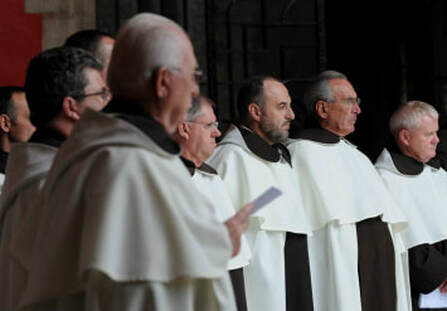Carmelite Formation
|
Formation is a term used in the Church to describe the process by which a person is prepared for religious life and ministry. It is a process that is never completed as growth and learning is continually being summoned from us. In many ways formation is about conversion and transformation and this is always about being the person that God created us to be. Formation is about being the most authentic and fruitful version of myself that I can be. This is a hard task as there will be a degree of resistance to change in everyone. Another difficulty is in facing the truth about ourselves and realising our own worth and beauty. I find it comforting that this is the path that are greatest saints have undergone. Every sinner has a past and every saint has a future.
|
Carmelites try to live in the footsteps of Jesus Christ. Like all Christians we share in his mission of transforming the world and like all religious we follow the evangelical counsels of chastity, poverty and obedience. As Carmelites, our way of doing all this is based on certain fundamental values which have been developed and expressed in a variety of ways over more than 800 years. These values can be expressed briefly as follows:
· To live constantly in the presence of God.
· To live as brothers and share this experience with others.
· To live in the world at the service of all God’s people.
Formation for Carmelite life involves experiencing these values and learning to identify with them. It is a journey of growth. This involves growing in awareness of self, of others, of God, of Carmel and of the Carmelite life. The aim of the Carmelite formation programme is to facilitate this journey and so the programme is made up of the following stages.
Initial contact with the Carmelites
Initially, those interested in Carmelite life find themselves in contact with the vocations co-coordinator. His job is not one of recruitment but of accompanying the enquirer through a period
of discernment and questioning. Together with other brothers and communities in the province, the vocations director will provide a space to grow in an awareness of the gift of life that the Lord has for the enquirer. It is also a time of growth. As we face into the reality of our lives and look at all the possibilities that are there for us, we face choice and making a choice can be a lonely experience. Hopefully you would find in the vocations co-ordinator a listening ear and an open heart. He too has been through this process and knows just how complex it can be.
After a period of visiting communities and getting to know the friars of the province, the enquirer may decide that he would like to explore the Carmelite vocation more intimately by asking to join the noviciate. Or, they may find that a clearer sense of their own vocation leads them in another direction.
Noviciate
Reception into the noviciate introduces the candidate into the Carmelite life so that he may experience living with us. During this year the novice is initiated into the following of Jesus Christ according to the Carmelite spirit. Experiences in the noviciate are designed to help him grow in prayer, community life and in this desire to serve others. He is encouraged to appreciate the need for some silence and solitude as aids to growth in his relationship with the Lord. In this way he is prepared to make a decision in faith about the future direction of his life, and the community can evaluate his readiness to make temporary vows of chastity, poverty and obedience. Many describe the noviciate as a yearlong time of retreat. It is certainly a time in which a person comes to know themselves more deeply. At the end of the year both the novice and the community decide what is best for the future of the novice.
Simple Profession
The period of simple vows has two primary aims: preparation for final vows and for the active apostolate. The number of years (normally 3-6) and the details of the programme depend upon the individual’s readiness for these steps and the nature of the apostolate to which he is called.
As brothers, those in simple vows are expected to grow in the communal spirit of religious life, sharing all things in common, being accountable for communal goods, being responsible for the growth and the spirit of the community. They are expected to give of themselves and share their talents by participating in the various aspects of community life such as prayer, study, house jobs and relaxation together. This involves learning to maintain a healthy balance of prayer, study, work and being with the community.
Final Profession
After this period is completed, the Carmelite will take final vows by means of which he commits himself totally to the Lord in the Order for the rest of his life. After final profession, candidates for the ministries of diaconate and priesthood normally undertake some further study.
Ongoing Formation
Carmelite formation is continuous and on-going; growth is a task for the whole of life. Therefore, every effort is made to ensure that Carmelites continue their growth by such means as spiritual
direction, retreats and renewal courses in ministry, religious life and Carmelite spirituality.
Questions for Reflection
· What does “living in the presence of God” mean to you?
· How does your relationship with others affect your relationship with God?
· How do you serve others?
· To live constantly in the presence of God.
· To live as brothers and share this experience with others.
· To live in the world at the service of all God’s people.
Formation for Carmelite life involves experiencing these values and learning to identify with them. It is a journey of growth. This involves growing in awareness of self, of others, of God, of Carmel and of the Carmelite life. The aim of the Carmelite formation programme is to facilitate this journey and so the programme is made up of the following stages.
Initial contact with the Carmelites
Initially, those interested in Carmelite life find themselves in contact with the vocations co-coordinator. His job is not one of recruitment but of accompanying the enquirer through a period
of discernment and questioning. Together with other brothers and communities in the province, the vocations director will provide a space to grow in an awareness of the gift of life that the Lord has for the enquirer. It is also a time of growth. As we face into the reality of our lives and look at all the possibilities that are there for us, we face choice and making a choice can be a lonely experience. Hopefully you would find in the vocations co-ordinator a listening ear and an open heart. He too has been through this process and knows just how complex it can be.
After a period of visiting communities and getting to know the friars of the province, the enquirer may decide that he would like to explore the Carmelite vocation more intimately by asking to join the noviciate. Or, they may find that a clearer sense of their own vocation leads them in another direction.
Noviciate
Reception into the noviciate introduces the candidate into the Carmelite life so that he may experience living with us. During this year the novice is initiated into the following of Jesus Christ according to the Carmelite spirit. Experiences in the noviciate are designed to help him grow in prayer, community life and in this desire to serve others. He is encouraged to appreciate the need for some silence and solitude as aids to growth in his relationship with the Lord. In this way he is prepared to make a decision in faith about the future direction of his life, and the community can evaluate his readiness to make temporary vows of chastity, poverty and obedience. Many describe the noviciate as a yearlong time of retreat. It is certainly a time in which a person comes to know themselves more deeply. At the end of the year both the novice and the community decide what is best for the future of the novice.
Simple Profession
The period of simple vows has two primary aims: preparation for final vows and for the active apostolate. The number of years (normally 3-6) and the details of the programme depend upon the individual’s readiness for these steps and the nature of the apostolate to which he is called.
As brothers, those in simple vows are expected to grow in the communal spirit of religious life, sharing all things in common, being accountable for communal goods, being responsible for the growth and the spirit of the community. They are expected to give of themselves and share their talents by participating in the various aspects of community life such as prayer, study, house jobs and relaxation together. This involves learning to maintain a healthy balance of prayer, study, work and being with the community.
Final Profession
After this period is completed, the Carmelite will take final vows by means of which he commits himself totally to the Lord in the Order for the rest of his life. After final profession, candidates for the ministries of diaconate and priesthood normally undertake some further study.
Ongoing Formation
Carmelite formation is continuous and on-going; growth is a task for the whole of life. Therefore, every effort is made to ensure that Carmelites continue their growth by such means as spiritual
direction, retreats and renewal courses in ministry, religious life and Carmelite spirituality.
Questions for Reflection
· What does “living in the presence of God” mean to you?
· How does your relationship with others affect your relationship with God?
· How do you serve others?

